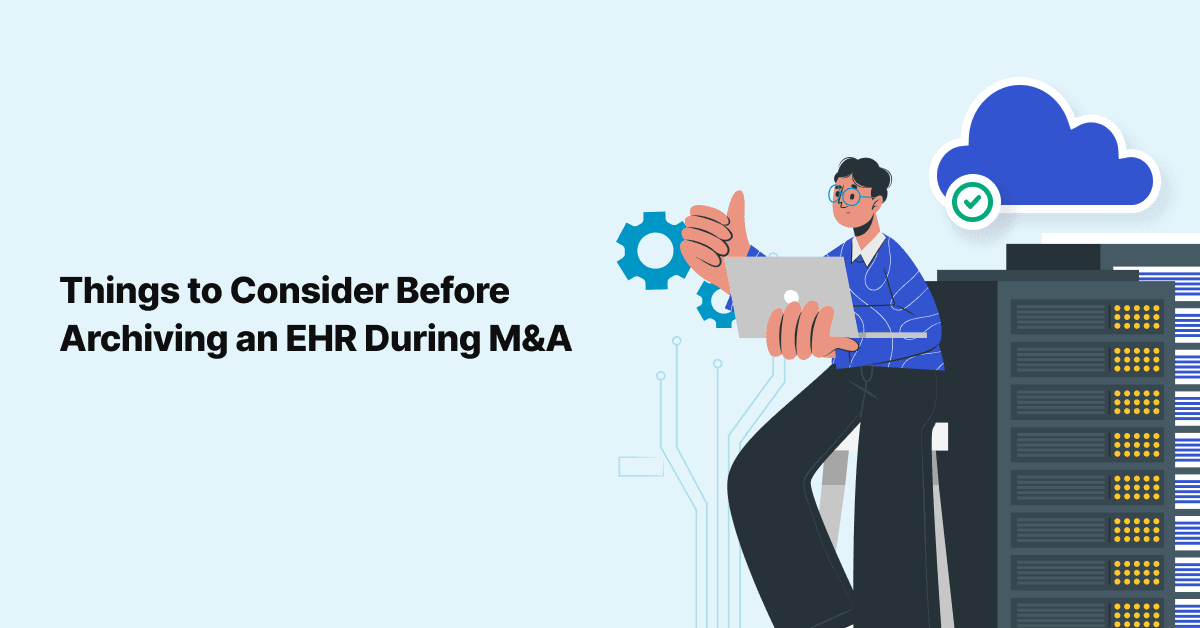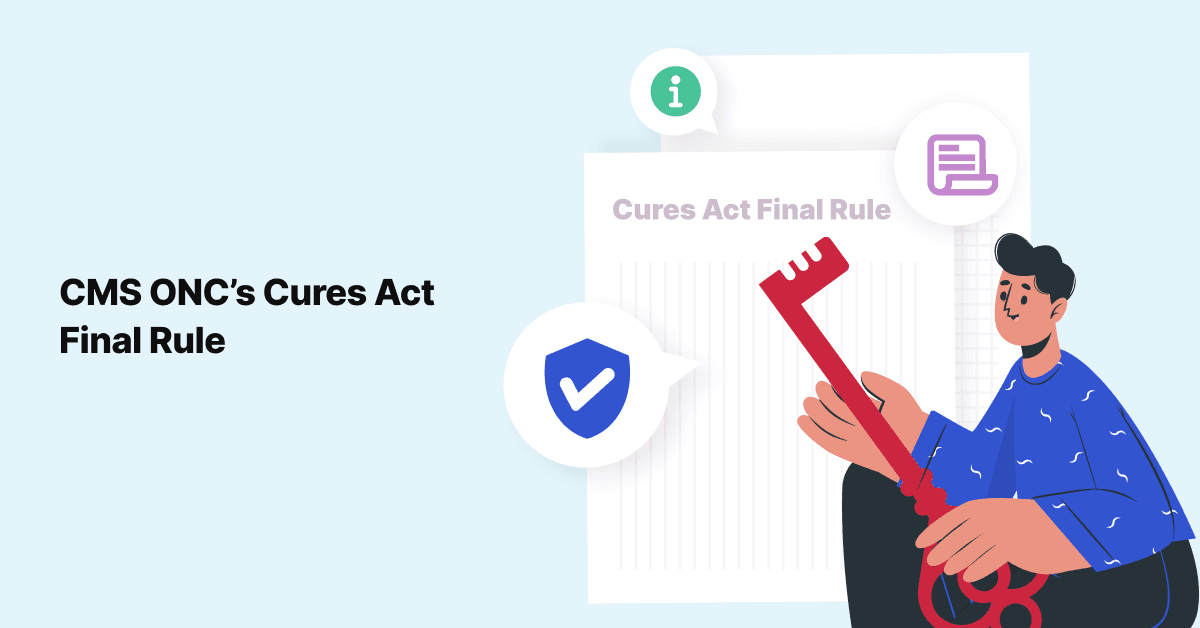
How to Create a Strategy for Data Extraction, Migration, and Archival While Switching to an EHR
The process of legacy EHR system retirement can bring a host of challenges. Multiple questions arise as a …

EHR or Electronic Health Records are being implemented increasingly in health organizations across several countries. Its ability to improve healthcare in terms of quality and cost-effectiveness makes it the need of the hour. However, despite the rising enthusiasm for its adoption and increasing usefulness, many times, the necessary attention is not paid to the ethical issues that might arise with EHR. Some of the ethical issue considerations regarding EHR that hospitals going through mergers and acquisitions should follow are:
1. Security Breaches
Data breaches in healthcare have shot up to quite an extent; a cybersecurity report identified a 35% increase in attacks on health plans in 2021. The privacy of patients is threatened by security breaches when health information that is confidential is disclosed to others without the consent of the individual or authorization. With the help of cloud storage, encryption, and password protection, portable EHRs could be made more secure. Security measures such as antivirus software, firewalls, and software for intrusion detection could be included to protect the integrity of data.
2. Data Inaccuracies
Data accuracy is assured by integrity, so appropriate actions need to be taken by Healthcare administrators to ensure integrity is maintained across various systems in use. EHRs help in improving the safety of patients through the reduction of health disparities, healthcare errors, and improving public health. However, concerns regarding reliable and accurate data being entered into the electronic record have been observed in many implementations. This is an unacceptable practice as it leads to risks of liabilities and patients for the health organizations and clinicians.
3. Confidentiality & Privacy
This is an ethical issue that is very important to consider. Patient information must be released only if it is permitted by the law or the patient consent is obtained by the healthcare provider. If a patient is unable to provide consent due to mental incapacity to make decisions or because of age, then a legal guardian or representative for the patient should provide consent on their behalf. Any clinical information should be considered confidential and has to be protected based on the HIPAA guideline. Adding strong security and privacy policies as additional steps of security is essential and would help in efficiently securing patient information.
4. Documentation Issues
Clinical documentation, if not adequate or appropriate, can lead to the rise of several issues such as unclear communication, patient mistrust, expensive and unnecessary diagnostic studies, inaccurate patient care information as well as wrong decisions of treatments.
During mergers and acquisitions, organizations can undergo staff turnovers. The new staff would be trained regarding the primary system, but they might not be well aware of the new legacy system, which could turn out to be a significant obstacle for the organization. The new EMR systems might not come across as helpful for the staff who have undergone turnover, particularly when they need to use it sporadically, and at the same time, they are in constant need of guide references.
Staff training is the next important aspect to be considered. It is particularly required for the new staff who undergo turnovers during merger and acquisition activities. During the initial legacy application sunsetting process, this does not seem to be an issue because the staff knows where to get all the required information and is usually familiar with the legacy application. However, the archive is a tool that is new and would therefore require training.
Ensuring that there is a project champion who is well aware of the workflows and processes for the legacy systems is important. The project champion must make decisions on important aspects of conversion, facilitate scope & change management, as well as manage the expectation of stakeholders in the organization, especially for the legacy systems.
Mergers and Acquisitions activities for healthcare providers have faced certain changes post the COVID-19 pandemic. Community-based clinics that are comparatively small, especially the ones in areas that were hit hard by the pandemic, would likely have increased motivation for consolidating in terms of gathering additional resources for operation.
As the industry segment participants seek to gain leverage and scale services from the standpoint of purchase, the challenge in the integration of two or more organizations of healthcare delivery could present challenges of data management and unique information technology components. During processes of healthcare M&As, however, managing the legacy EHR systems should be considered.
The approach of ‘systemness’: One of the key success predictors of M&A is dependent on whether an approach of ‘systemness’ could be obtained by the two organizations. This means that they would be able to merge truly and realize the benefit of cost and operational efficiencies in having a meaningful information exchange through decision-making that is data-driven and interoperability with analytics and business intelligence. The bottom line is that it suggests evaluation of the processes and technologies of both the organizations (Application Rationalization) and adopting the best solutions for going forward for the combined entity.
Risk management: Large EHR implementations often involve the consolidation of more than 30-40 administrative systems and clinical and financial data silos that are in varying use stages, but all with a cost and risk meter ticking. Better risk management on account of consolidation of disparate systems will result in lowering technical burdens, lowering costs of maintenance, managing outdated server infrastructure, and managing the risk of cybersecurity in the process of M&As.
Long-term EHR archive solution: Compliant, secure, and long-term EHR archive solution record storage helps in managing the portfolio of legacy applications. The solution helps in minimizing the legacy EMR, GL, and ERP volumes which allow the organization to save money on existing contracts of maintenance, mitigation of technical risks, and reduction of labor burden.
Legacy system data archiving helps in offering long-term savings in terms of maintenance and licensing of hardware or software. An intelligent archival solution like Muspell Archive, for instance, provides intelligent data archiving, which helps in unlocking the value of clinical data in an unconventional way. In the situations where the legacy system data have to be retained, robust archive solutions can help in enabling savings in productivity and staff training. An archival application that is maintained typically to evolve with the current design trends and technologies helps in decreasing training and orientation for business users. Hence, keeping in mind the essential considerations like staff training and ethical aspects during EHR archiving are important in order to facilitate optimum results.
Join over 3,200 subscribers and keep up-to-date with the latest innovations & best practices in Healthcare IT.

The process of legacy EHR system retirement can bring a host of challenges. Multiple questions arise as a …

On March 9, 2020, ONC released its Cures Act Final Rule, and it was published in the Federal Register on May …